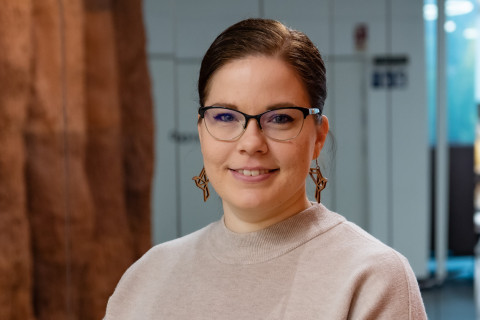Anu Puustinen worked in the restaurant industry for a long time before finding a new career path, thanks to studies in law.
From general upper secondary school straight to university, from Master’s to PhD, and from there to pursue a teaching and research career at the university? For many researchers and teachers, this is a familiar path, but there are also exceptions: Anu Puustinen worked in the restaurant industry for fifteen years before taking up her current position as a teacher and researcher of law.
“I enjoy academic freedom and the subjects I teach and study. The university is a very inspiring work community. There are some truly amazing characters among our scholars of law, and our students, too, are passionate about their field. I get to plan my work and days at work to suit my needs. And coming from the world of restaurants and nightclubs, my ‘customers’ here at the university tend to be sober. So, there are many upsides to this job,” Puustinen says, laughing.
Puustinen has never been afraid of making bold moves when it comes to her career: after graduating from general upper secondary school, she moved to Augsburg, Germany, to be an au pair – without really speaking the language. There, she took studies in the German language and culture. After returning to Finland, she completed a Bachelor of Hospitality Management degree at Karelia University of Applied Sciences and worked in restaurants and nightclubs for fifteen years.
“I completed management training at S Group and worked in supervisory roles for five years. My phone kept ringing all the time, and I started thinking that there must be an easier way to get paid.”
Law was one of the fields Puustinen considered already after general upper secondary school. In 2015, she applied to study law at the University of Eastern Finland. She got wait-listed but took up studies in law in the Open University for a year. The route from the Open University to becoming a degree-seeking student opened in public law, i.e., the very subject she had wanted to study in the first place. Puustinen chose criminal and procedural law as her major, and criminal psychology as her minor.
“Why do some people become criminals? I find this question interesting, and it has also driven me to study law,” Puustinen says.
It is good to talk about equality, because it is impossible to change things if they’re not even talked about.
Anu Puustinen
University Teacher

Being a teaching and research assistant served as a stepping-stone to an academic career
Puustinen ended up pursuing an academic career by chance in spring 2019, when Professor of Procedural Law Mika Launiala asked about her interest in working as a teaching and research assistant. The project focused on the decisions of the Nordic Supreme Courts.
“My skills in the Swedish language weren’t even that good, but there I was, analysing resolutions of the Swedish, Norwegian and Danish Supreme Courts. That’s where it all started, and when I graduated in spring 2020, I found myself in a University Teacher position,” Puustinen says.
Currently, Puustinen teaches criminal and procedural law as well as criminal psychology. Like many young researchers and teachers, Puustinen, too, has worked in fixed-term contracts.
“At first, it was really nerve-wrecking whenever the end of my contract was drawing nearer. Now, I’m a little more used to it. And when you’re at the start of your career, you’re still nervous about meeting all the expectations,” Puustinen says.
Equality is an important theme in research and at the workplace
Alongside teaching, Anu Puustinen is writing her doctoral dissertation. For the next year, her research is funded by a grant from the Olga and Kaarle Oskari Laitinen Foundation.
“My PhD deals with sexual offences where both the victim and the perpetrator are of the same sex. Legislation starts from an assumption of the perpetrator usually being male, and the victim female. But when the victim and the perpetrator are of the same sex, problems relating to evidence easily arise.”
In her doctoral dissertation, Puustinen examines equality, which is also a topical theme in the academic community.
“My experience of the university is one very much characterised by equality, but I’ve also heard some comments from women that they feel belittled. Some fields are more conservative than others, and in those fields, women have to work harder to impress. Students bring a completely new perspective to traditional attitudes, and the situation in the workplace also changes naturally when people retire. It is good to talk about equality, because it is impossible to change things if they’re not even talked about,” Puustinen points out.
Anu Puustinen is one of the 187 University Teachers working at the University of Eastern Finland. (Situation September 2022)

